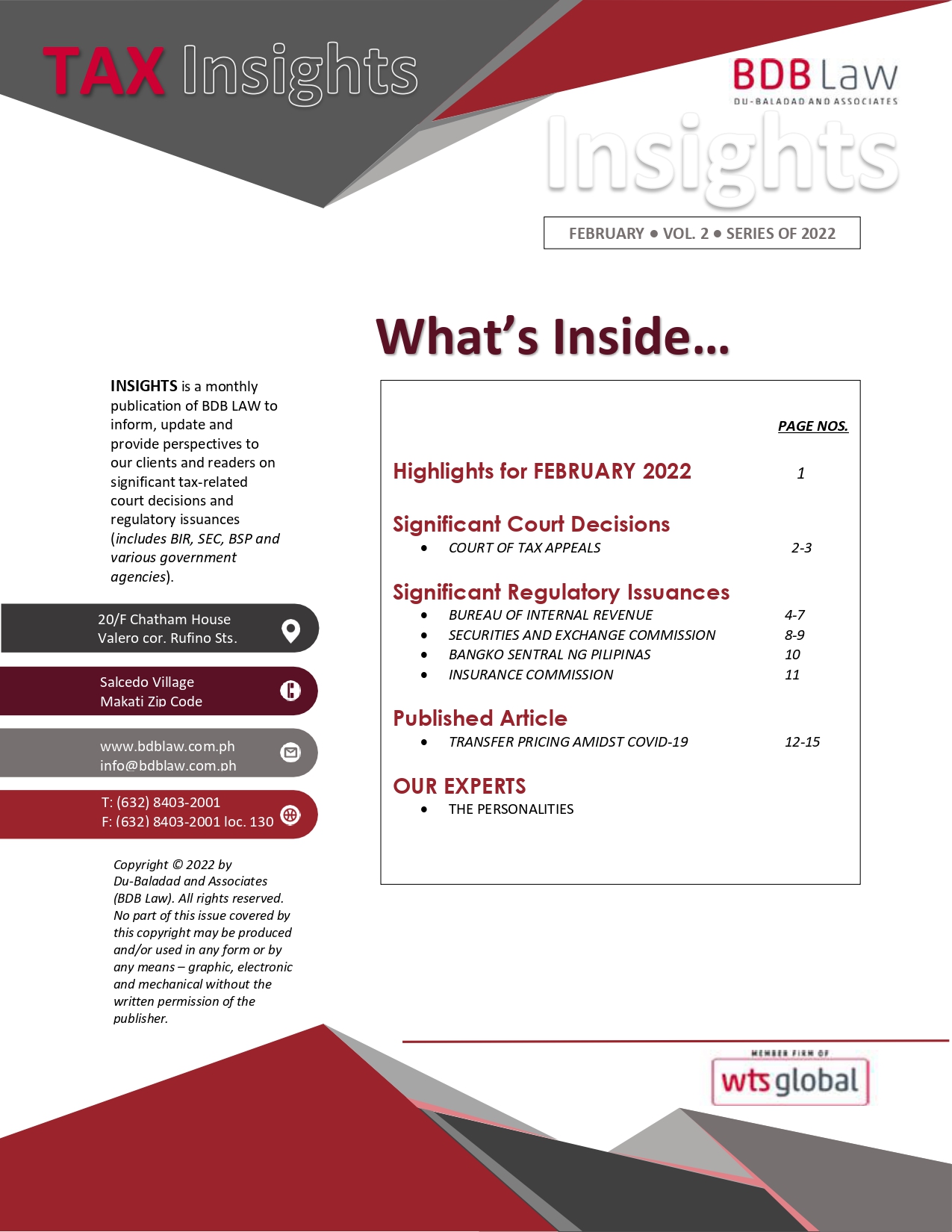


FEBRUARY • VOL. 2 • SERIES OF 2022
INSIGHTS is a monthly publication of BDB LAW to inform, update and provide perspectives to our clients and readers on significant tax-related court decisions and regulatory issuances (includes BIR, SEC, BSP, and various government agencies).

DISCLAIMER: The contents of this Insights are summaries of selected issuances from various government agencies, Court decisions, and articles written by our experts. They are intended for guidance only and as such should not be regarded as a substitute for professional advice.
Copyright © 2022 by Du-Baladad and Associates (BDB Law). All rights reserved. No part of this issue covered by this copyright may be produced and/or used in any form or by any means – graphic, electronic, and mechanical without the written permission of the publisher.
What's Inside ...
- HIGHLIGHTS FOR FEBRUARY 2022
- SIGNIFICANT COURT DECISIONS
- Court of Tax Appeals
- SIGNIFICANT REGULATORY ISSUANCES
- Bureau of Internal Revenue
- Securities and Exchange Commission
- Bangko Sentral Ng Pilipinas
- Insurance Commission
- PUBLISHED ARTICLE
- Transfer Pricing Amidst COVID-19
- OUR EXPERTS
- The Personalities
- The Personalities


HIGHLIGHTS for FEBRUARY 2022
COURT OF TAX APPEALS DECISIONS
- A protest is denied absent an FDDA upon the taxpayer's receipt of a demand for payment of its tax liabilities. (Ten-Four Readymix Concrete, Inc. v. Commissioner of Internal Revenue, CTA EB No. 2311, January 25, 2022)
- The date of commission of the crime of tax evasion would depend on the mode of commission as alleged in the information charged (People of the Philippines v. Angelo R. Balili, CTA Crim Case No. A-8, January 25, 2022)
- A LOA becomes invalid as a result of the failure to serve the same on the taxpayer within the prescribed period of 30 days (Vanguard Logistics Services Phils., Inc. v. Commissioner of Internal Revenue, CTA Case No. 10155, January 27, 2022)
BIR ISSUANCES
- RR No. 01-2022, January 27, 2022 – This provides for the extension of deadlines of various filings and submissions to the BIR.
- RMC No. 6-2022, January 17, 2022 – This provides clarification on the DST imposed under Section 175 of the 1997 Tax Code, as amended on the transfer of shares of stocks.
- RMC No. 16-2022, January 31, 2022– This clarifies the scope and coverage of the extension of the deadline granted pursuant to RR No. 1-2022.
SEC ISSUANCES
- SEC-Memorandum Circular No. 1 Series of 2022 dated January 27, 2022 – This provides the adoption of Philippine Standard on Auditing (PSAs) and Philippine Financial Reporting (PFRs)
BSP ISSUANCES
- BSP Memorandum No. M-2022-003, January 12, 2022 – This provides the Frequently Asked Questions (FAQs) on the Framework for Basic Deposit Accounts
IC ISSUANCES
- IC Circular Letter CL-2022-03, January 18, 2022 – This provides the Guidelines in the Renewal of Insurance Agent's License Expiring 31 December 2021.

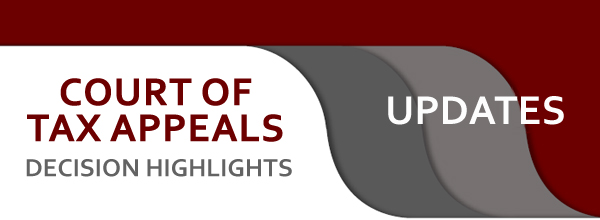
Withholding Agent and the taxpayer need not be related parties in order for the withholding agent to have a right to file a claim for refund on behalf of the taxpayer.
This is an appeal from the decision of the CTA First Division granting the claim for refund of Toledo Power Company on erroneously paid final withholding taxes during the taxable year 2014 and 2015 arising from income payments made to Yashima & Co. Ltd, a non-resident foreign corporation exempt from tax under RP-Japan Tax Treaty, as amended.
The Commissioner of Internal Revenue (“CIR”) argues that Toledo, being a mere withholding agent, has no personality to file the claim for refund. The CIR insists that Toledo is not the statutory taxpayer who is the proper person to file a claim for refund or tax credit. Thus, Toledo has no legal standing to pursue the present petition since it is not the real party in interest.
The CTA En Banc ruled that the withholding agent and the taxpayer need not be related parties in order for the withholding agent to have a right to file a claim for refund on behalf of the taxpayer. The CTA En Banc cited the decision of the Supreme Court in Commissioner of Internal Revenue v. Smart Communication, Inc., (G.R. Nos. 179045-46) dated August 25, 20210 stating that in case the taxpayer does not file a claim for refund, the withholding agent may file the claim. (Commissioner of Internal Revenue v. Toledo Power Company, CTA EB No. 2359, January 5, 2022)
A protest is denied absent an FDDA upon the taxpayer's receipt of a demand for payment of its tax liabilities.
This is an appeal seeking the reversal of the decision of the CTA – First division which dismissed the Petition filed by Ten-Four for lack of jurisdiction due to prescription.
On May 18, 2018 Ten-Four filed a protest against the Commissioner of Internal Revenue’s (“CIR”) Formal Letter of Demand dated April 10, 2018. However, on December 21, 2018, Ten-Four received a Preliminary Collection Letter (PCL) dated November 27, 2018 and a Final Notice Before Seizure (FNBS) dated December 17, 2018 despite its non-receipt of respondent's decision on its protest. Ten-Four only filed its Petition for Review before the CTA on May 20, 2019.
The CIR then filed a motion for early resolution on the issue of jurisdiction considering the Petition for Review was filed out of time. Ten-Four argued that the CTA has jurisdiction and the case falls under “other matters” since the CIR hasn’t decided on its Protest.
The CTA En Banc ruled that although Ten-Four did not receive an FDDA, it was however served with a PCL and an FNBS. It could be reasonably assumed that the Protest had been denied with the issuance of the PCL and the FNBS, both of which are unequivocal demands of payment of tax deficiencies. Thus, the counting of the thirty (30) day period to appeal before the CTA starts from the receipt of the PCL. (Ten-Four Readymix Concrete, Inc. v. Commissioner of Internal Revenue, CTA EB No. 2311, January 25, 2022)
The date of commission of the crime of tax evasion would depend on the mode of commission as alleged in the information charged.
This is an appeal on the decision of the RTC Makati Branch dismissing the criminal information for tax evasion filed against QNX Solutions, Incorporated (QNX), and Angelo R. Balili, in his capacity as President thereof, on June 2, 2020.
QNX Solutions contends that the date of receipt of the Final Notice Before Seizure (FNBS) should not be considered as the date when the offense occurred. Instead, QNX Solutions argued that the alleged commission of the crime should be after 13 October 2013 or thirty (30) days after the receipt of the FAN (when the period of demand to pay the alleged tax deficiencies expired).
The CTA ruled that a perusal of the information filed against QNX Solutions would reveal that the crime of tax evasion charged therein was due to willful non-payment. Applying the principles laid down in Lim, Sr. et al v. Court of Appeals (G.R. Nos. L-48134-37), the tax evasion in the present case was committed after the BIR served notice and demand on September 13, 2013. Since the demand for payment contained in the FAN was not immediate, said demand could only attain finality after the lapse of 30 days from QNX's receipt thereof, or on October 14, 2013. Therefore, to toll the running of the five-year prescription period, the BIR should have filed a criminal complaint with the DOJ on October 14, 2018 at the latest. Thus, when the criminal complaint was filed only on April 11, 2019, the same was already a forgone action or remedy (People of the Philippines v. Angelo R. Balili, CTA Crim Case No. A-8, January 25, 2022)
A LOA becomes invalid as a result of the failure to serve the same on the taxpayer within the prescribed period of 30 days.
This is a Petition seeking to nullify the Formal Letter of Demand issued against Vanguards Logistics in connection with its alleged internal revenue tax liabilities for taxable year 2014.
Vanguard Logistics argues that the subject LOA dated April 1, 2016 is void and has no force and effect because the same was not served upon Vanguard Logistics within 30 days from its issue date as it was served only on June 2, 2016 or sixty (6o) days after its issuance
The CTA citing the ruling of the Supreme Court in AFP General Insurance Corporation v. Commissioner of Internal Revenue (G.R. No. 222133) wherein RAMO No. 1-00 was interpreted as one clearly imposing a 30-day expiration period for service; otherwise, the LOA becomes wholly unenforceable. In this case, the subject LOA was issued on April 1, 2016. Thus, the CIR only had until May 1, 2016 within which to serve the said LOA. However, as testified to by Vanguards Logistics witnesses, Vanguards Logistics received the subject LOA only on June 2, 2016 or sixty-two (62) days after its issuance. Thus, In the absence of revalidation, the subject LOA became void and without effect. Resultantly, any investigation conducted pursuant to the void LOA is unauthorized and therefore, a nullity. (Vanguard Logistics Services Phils., Inc. v. Commissioner of Internal Revenue, CTA Case No. 10155, January 27, 2022)

RR No. 01-2022,
January 27, 2022
This provides for the extension of deadlines of various filings and submissions to the BIR.
This provides for the extension of deadlines of various filings and submissions to the BIR in view of placing various parts of the country under Alert Level 3 or higher.
- COVERAGE – This extends the statutory deadlines for the following activities falling due during the period declared as Alert Level 3 or higher by the IATF this month of January 2022, for thirty (30) calendar days from their due dates :
1. Submission and/or filing of the documents and/or returns, as well as the payment of the corresponding taxes due thereon;
2. Filing of position papers, replies, protests, documents, and other similar letters and correspondences in relation to the on-going BIR audit investigation;
3. Filing of application for tax refund, including VAT refund, and processing of VAT refund claim; and
4. Issuance of service of Assessment Notices, Warrants of Distraint and/or Levy, ad well as Warrants of Garnishment, to enforce collection of deficiency taxes.
- COVERED TAXPAYERS – The extension applies to all taxpayers within the jurisdiction of the Revenue Region (RR) and Revenue District Offices (RDO) of the BIR classified under Alert Level 3 or higher by the IATF.
- EXTENDED DUE DATES FALL ON A HOLIDAY OR NON-WORKING DAY – the submission and/or filing shall be made on the next working day.
- FILING OF TAX RETURNS AND PAYMENT OF TAXES – Affected taxpayers within the RRs and RDOs may file their returns and pay their corresponding taxes due thereon to the nearest AABs or to BIR Revenue Collection Officer, notwithstanding the covered jurisdiction of the RDO.
RMO No. 3-2022,
January 14, 2022
This provides for the creation of ATC for revenue source under RA No. 9505 or PERA Act.
The Alphanumeric Tax Code (“ATC”) for the final income taxes withheld pursuant to the Implementation of RA No. 9505 or the Personal Equity and Retirement Account (PERA) Act of 2008 is created as follows:
| ATC | Description | Tax Rate | Legal Basis | BIR Form No. |
| WI730 | Total income earned from the time its opening to its withdrawal under PERA Act of 2008 | 20% | RA No. 9505/ RR No. 6-2021 | 1601-FQ |
RMO No. 4-2022,
January 14, 2022
This provides for the modification of ATC of selected revenue source under RA No. 11534 or CREATE Act.
This modifies the existing ATC for BIR Form Nos. 1702Q, 1702-RT, and 1702-MX pursuant to Republic Act No. 11534 (CREATE Act) to facilitate the proper identification and monitoring of tax collection from Corporate Income Tax pursuant to the implementation of Republic Act No. 9505.
RMO No. 9-2022,
January 21, 2022
This prescribes the use of video conference hearing as an alternative mode to face-to-face formal investigation for administrative cases.
This prescribes the use of video conference hearing as set forth by the Supreme Court in A.M. No. 20-12-01-SC as an alternative mode to face-to-face formal investigation for administrative cases in view of the health risks posed by Covid-19, local travel restrictions during the different community quarantine status imposed in the different cities and provinces by the National Government.
This provides guidelines on the following:
1. Equipment requirements;
2. Preliminary notice of holding of hearings;
3. Notice of hearings;
4. Conduct of hearings;
5. Technical support;
6. Recording of hearings; and
7. Pertinent documents.
RMC No. 3-2022,
January 12, 2022
This clarifies the preparation of assessment notices for compromise penalty.
This clarifies the preparation of assessment notices for compromise penalty.
Under this circular, it is provided that the prescribed formats under RR No. 18-2013 such as PAN and FLD shall now be composed of Part I and Part II, where Part I shall pertain to deficiency basic tax(es) and civil penalties, while Part II shall pertain to the assessed compromise penalty(ies) relative to violations uncovered during the audit.
The preparation of the BIR Form No. 0605 – Payment Form for the settlement/payment of the deficiency basic tax and civil penalties in “Part I” of the assessment notices and BIR Form No. 0605 for compromise penalty(ies) in Part II shall be done separately.
RMC No. 6-2022,
January 17, 2022
This provides clarification on the DST imposed under Section 175 of the 1997 Tax Code, as amended on the transfer of shares of stocks.
The following transfers of shares of stock shall also be subject to DST under Section 175 of 1997 Tax Code, as amended:
1. Transfer pursuant to a Deed of Donation;
2. Transfer pursuant to a Will of the Decedent as approved by the probate court in a Judicial Settlement of Estate; and
3. Generally, transfer of shares of stock from the decedent’s estate to the estate to heirs thru intestate succession (without a Will) is not subject to DST under Section 175 of the 1997 Tax Code, as amended, as ownership of such shares is transferred to the heirs via succession by operation of law.
But in the case of Judicial Settlement of Estate as approved by the probate court or an Extra-Judicial Settlement of Estate (both without a Wil), the heir/s specifically waive/s or renounce/s his or her share over the inheritance (i.e., shares of stocks left by the decedent), then, in such a situation, the renounced/waived shares of stock to be transferred to another heir/s shall also be subject to DST pursuant to Section 175 of the 1997 Tax Code, as amended.
RMC No. 11-2022,
January 24, 2022
This circularizes RA No. 11595 or An Act Amending the Retail Trade Liberalization Act of 2000.
This circularizes RA No. 11595 or An Act Amending the Retail Trade Liberalization Act of 2000 by lowering the required paid-up capital for foreign retail enterprises.
RMC No. 16-2022,
January 31, 2022
This clarifies the scope and coverage of the extension of the deadline granted pursuant to RR No. 1-2022.
This clarifies the scope and coverage of the extension of the deadline granted pursuant to RR No. 1-2022.
- Section 2, item 1 of RR No. 1-2022 which covers “submission and/or filing of the documents and/or returns, as well as the payment of the corresponding taxes due thereon,” shall include submissions of all required documents, including but not limited to Inventory Lists, and all returns, whether tax returns or information returns, including Alphalists, among others. It shall also include the registration of books of accounts.
- Section 2, item 3 of RR No. 1-2022, which covers “filing of application for tax refund, including VAT refund, and processing of VAT refund claim,” shall also apply even if the applicant is a registered taxpayer in the area declared as Alert Level 1 or 2 provided that the venue of the filing thereof is in the area declared as Alert Level 3 or higher.
This case is applicable to the filing of claims in the VCAD at the National Office of direct exporters who are registered in various RDO jurisdictions.
The extension shall also apply to the processing period prescribed for VAT refund processing. For example, if the VAT refund claim was filed on December 15, 2021, the 90-day processing period is until March 14, 2022. However, in view of the declaration of Alert Level 3 in the NCR, the processing of VAT refund claims shall be extended until April 13, 2022 (30 days from March 14, 2022).
The extension of the deadline covering all the items in Section 2 of RR No. 1-2022 applies to all taxpayers within the jurisdiction not only of the RRs and RDOs but also of the LTS Offices of the BIR classified under Alert Level 3 or higher by the IATF for the month of January 2022.

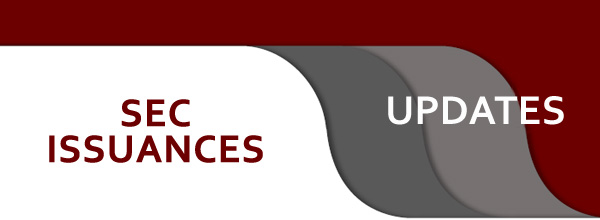
SEC-Memorandum Circular No. 1 Series of 2022 dated January 27, 2022
This provides the adoption of the Philippine Standard on Auditing (PSAs) and Philippine Financial Reporting (PFRs).
The Commission approved the adoption of the following pronouncement as part of SEC’s rules and regulations on financial reporting:
A. PSAs
| Pronouncement | Effectivity Date |
| 1. PSA 250 (Revised) Consideration of Laws and Regulations in an Audit of Financial Statements including Related Conforming Amendments to Other Philippine Standards | Effective for audits of financial statements for periods beginning on or after December 15, 2020 |
| 2. PSA 540 (Revised) Auditing Accounting Estimates and Related Disclosures and Conforming and Consequential Amendments to Other Philippines Standards Arising from PSA 540 (Revised) | Effective for audits of financial statements for periods beginning on or after December 15, 2020 |
| 3. Philippine Standard on Auditing 315 (Revised 2019), Identifying and Assessing the Risk of Material Misstatement and, Conforming and Consequential Amendments to Other Philippine Standards Arising from PSA 315 (Revised 2019) | Effective for audits of financial statements for periods beginning on or after December 15, 2020 |
| 4. Philippine Standard on Related Services 4400 (Revised), Agreed-upon Procedures Engagements | Effective for agreed-upon procedures engagements for which the terms of engagement are agreed on or after January 1, 2022 |
|
5. Suite of Quality Standards a. Philippine Standard on Quality Management on 1 (Previously Philippine Standard on Quality Control 1), Quality Management for Firms that Perform Audits or Reviews of Financial Statements, or Other Assurance or Related Services Engagements |
Effective as of December 15, 2022
|
| b. Philippine Standard on Quality Management 2, Engagement Quality Reviews | Effective for audits and reviews of financial statements for periods beginning on or after December 15, 2022l, and effective for other assurance and related services engagements beginning on or after December 15, 2022. |
| c. Philippine Standard on Auditing 220 (Revised), Quality Management for an Audit of Financial Statements | Effective for audits of financial statements for periods beginning on or after December 15, 2022 |
B. PFRs
| Pronouncement | Effectivity Date |
| 1. Annual Improvement to PFRS Standard 2018-2020 | Effective for annual periods beginning on or after January 1, 2022 |
| 2. Amendments to PAS 1, Classification of Liabilities as Current or Non-current | Effective for annual periods beginning on or after January 1, 2023 |
| 3. Amendments to PAS 16, Property, Plant and Equipment: Proceeds before Intended Use | Effective for annual periods beginning on or after January 1, 2022 |
| 4. Amendments to PAS37, Onerous Contracts – Cost of Fulfilling a Contract | Effective for annual periods beginning on or after January 1, 2022 |
| 5. Amendments to PFRS 17, Insurance Contracts | Effective for annual periods beginning on or after January 1, 2023 |
| 6. Amendments to PFRS 3, Reference to the Conceptual Framework | Effective for annual periods beginning on or after January 1, 2022 |

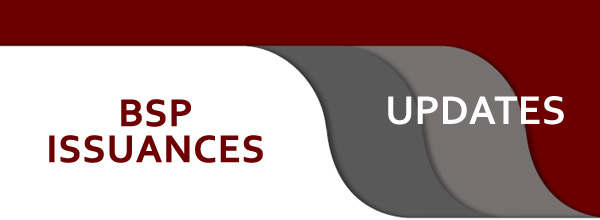
BSP Memorandum No. M-2022-003,
January 12, 2022
This provides the Frequently Asked Questions (FAQs) on the Framework for Basic Deposit Accounts.
To provide additional guidance and clarifications on the implementation of Circular No. 992 dated 01 February 2018, or the Framework for Basic Deposit Accounts (BDAs), the BSP is hereby issuing the attached FAQs. Said document covers the following major points in implementing Circular No. 992:
1. Modes of BDA offering;
2. Application of the maximum balance limit;
3. Consequence of deposit limit breach;
4. Ownership of multiple accounts; and
5. Implementation of simplified Know-Your-Customer (KYC) requirements.

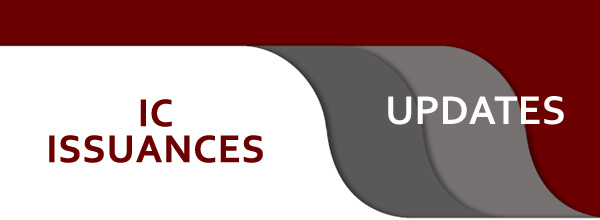
IC Circular Letter
CL-2022-03 dated January 18, 2022
This provides the Guidelines in the Renewal of Insurance Agent's License Expiring 31 December 2021.
- All applications for renewal of insurance agent licenses for the Licensing Year 2022-2024 shall be submitted through the Enhanced Licensing System (ELS) by the insurance companies represented by the agents.
- All applications shall be accompanied by:
a. Duly Accomplished, readable, legible, and notarized Application Form signed by the authorized representative of the company with a rank of at least Vice-President. ln case of unavailability of a notary, a notation must be made on the application form indicating that a notary was unavailable at the time of accomplishment or submission;
b. Documentary Stamp Tax affixed to the hard copy which must be reflected in the soft copy to be uploaded;
c. Signature (handwritten/electronic signature) of authorized company representative affixed to the hard copy which must be reflected in the soft copy to be uploaded;
d. List of Names, Type of License, and Commissions Earned of the Agents.

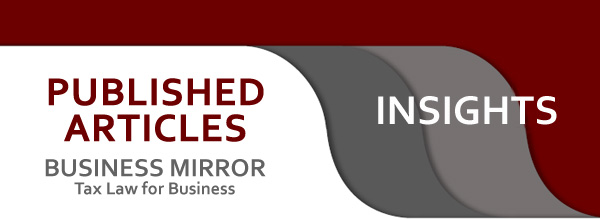
Transfer Pricing Amidst COVID-19
By Atty. Jomel N. Manaig
Almost two years on and the world is still reeling from the effects of the Covid-19 pandemic. To give some perspective, the International Monetary Fund expects global economic growth in 2021 to be at 5.9% with further declines to 4.4% and 3.8% in 2022 and 2023, respectively. The slow global growth is the product of the disruptions brought by Covid-19 which contributed to increase in poverty, sharp reduction of remittances flows, and volatile commodity prices, among others.
Global trade was likewise not spared. Along with the effect on basic economic circumstances, Covid-19 presented a complex hurdle on the determination of the arm’s length principle. With the BIR’s renewed vigor to implement transfer pricing audits to test the compliance of related party transactions to the arm’s length principle, taxpayers must make significant strides to justify their pricing mechanisms amidst the backdrop of Covid-19.
Compliance to the arm’s length principle relies heavily on comparability analysis. Basically, this involves the gathering of historical data from comparable transactions and/or entities to determine whether a related party transaction adhered to the arm’s length principle. However, historical data may not accurately reflect current economic realities or may have skewed figures due to the economic impairments caused by the pandemic.
In a bid to guide taxpayers and tax administrators, the Organization for Economic Co-operation and Development (“OECD”) provided for practical approaches regarding the performance of comparability analyses to address the information deficiencies on the impact of Covid-19.
Comparability analysis may be supported by a separate analysis on the changes in certain key metrics from the pre-Covid-19 years against the present. Such key metrics may include sales volume, capacity utilization, Covid-19-related incremental or exceptional costs, government assistance and interventions, and macroeconomic information. A comparison of budgeted/forecasted data against the actual results may also be used in assessing the financial impacts of Covid-19. These analyses are aimed to explain to tax administrators the “should be” financial outcomes of the taxpayer had it not been for Covid-19.
The analyses prepared by taxpayers should be based on reliable information preferably from publicly available historical data. However, the problem with publicly available historical data is that it may not accurately represent the current economic circumstances due to the lag in time between the occurrence of the transaction and the availability of information regarding that transaction. As such, use of the said data may not provide a sufficiently reliable benchmark without considering the specific impact of the pandemic.
Considering the said limitation, the OECD advises tax administrators to take into consideration certain practical approaches in order to minimize disputes where taxpayers are making good faith efforts to determine arm’s length prices despite the information deficiencies associated with the Covid-19 pandemic.
One of these practical approaches is the use of reasonable commercial judgment supplemented by contemporaneous information to set a reasonable estimate of the arm’s length principle. Here, taxpayers, after exerting reasonable and appropriate due diligence, must be allowed to evaluate the likely effects of the Covid-19 pandemic and implement appropriate changes in their transfer prices. Taxpayers must also document the best available market evidence currently available to complement its evaluation.
Another practical approach is for tax administrators to allow for an “outcome-testing” approach where taxpayers are allowed to incorporate information that becomes available after the close of the taxable year to determine arm’s length conditions and report results on the tax return. However, local application of this approach may require the BIR to issue related guidelines since it may ultimately lead to significant amendments in the tax returns. Without said guidelines, taxpayers may shy away from amending their tax returns considering the fines and penalties attendant to such amendment.
Lastly, the OECD also recommends the use of more than one transfer pricing method to corroborate the arm’s length price of a related party transaction.
In addition to changes in the comparability analyses, the OECD recommended the use of price adjustment mechanisms to provide for flexibility while maintaining an arm’s length outcome. The use of price adjustments would address the issue of information deficiencies. However, given the scope of the potential adjustments, extreme care should be practiced.
Evidently, timely and accurate information is key in transfer pricing. While taxpayers may gather the necessary information on its own, it is highly recommended to consult your transfer pricing expert in order to give you insights on all the intricacies and complexities in transfer pricing, especially in the time of Covid-19.
----------------------------------------------
For inquiries on the article, you may call or email
ATTY. JOMEL N. MANAIG
Junior Partner
T: +63 2 8403-2001 local 380
This email address is being protected from spambots. You need JavaScript enabled to view it.



DISCLAIMER: The contents of this Insights are summaries of selected issuances from various government agencies, Court decisions and articles written by our experts. They are intended for guidance only and as such should not be regarded as a substitute for professional advice.
Copyright © 2022 by Du-Baladad and Associates (BDB Law). All rights reserved. No part of this issue covered by this copyright may be produced and/or used in any form or by any means – graphic, electronic and mechanical without the written permission of the publisher.






